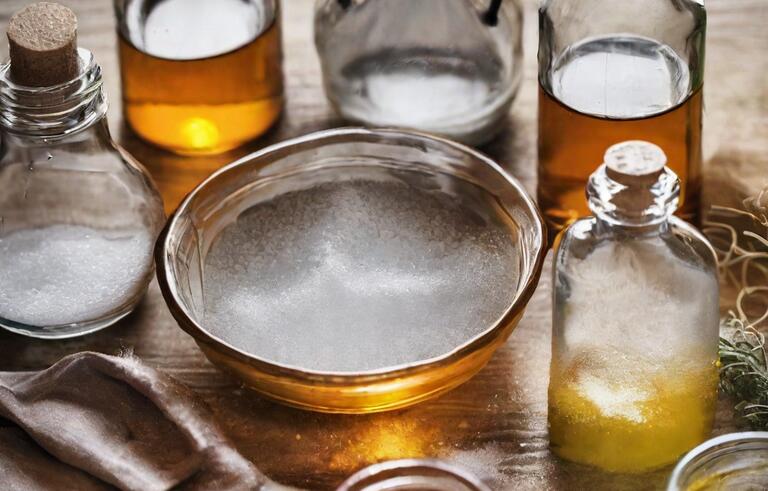Are you looking for a simple, affordable way to improve your health and wellness? You must try Baking Soda(also known as sodium bicarbonate). It can provide potential benefits when consumed properly. From relieving heartburn to supporting kidney health, baking soda may be a versatile addition to your wellness routine.
However, it’s crucial to understand the right way to drink baking soda for optimal results. Using the incorrect dosage or consuming it at the wrong times can minimize its effectiveness or even cause unintended side effects. This guide will cover the ideal amounts to drink, the best times, and tips for more palatable.

Why Drink Baking Soda Water? The Science-Backed Benefits
Here’s a closer look at some of the top science-backed benefits of sipping on baking soda water:
1. Heartburn Relief
If you frequently suffer from acid reflux or heartburn, baking soda could be your new best friend. Its alkaline properties can help neutralize stomach acid, providing fast relief from that burning sensation.
Many people use it as a natural, affordable antacid alternative. One study found that drinking a baking soda solution temporarily neutralized stomach acid as effectively as a popular over-the-counter antacid medication.
2. Kidney Support
Some promising research shows that drinking baking soda water may help slow the progression of chronic kidney disease by reducing acid accumulation in the body. This takes the strain off the kidneys and allows them to function better.
A 2009 study found that daily baking soda consumption helped slow kidney disease progression in patients with advanced chronic kidney disease. The alkalizing effect helped neutralize acids that can further damage kidneys.
3. Exercise Performance
Surprising but true – multiple studies suggest baking soda can improve athletic performance by allowing you to exercise at higher intensities for longer periods. It helps neutralize lactic acid buildup in muscles, delaying fatigue.
One study gave athletes a baking soda drink before an intense cycling session. Those who consumed the baking soda were able to cycle 25% longer before becoming exhausted compared to the placebo group.
4. UTI Prevention
Baking soda may help make your urine more alkaline, creating an unfriendly environment for bacteria that cause urinary tract infections (UTIs). Some use it as a natural preventative measure, especially for those prone to frequent UTIs.
Research shows that UTIs are more likely to occur when urine has a low pH and is overly acidic. Baking soda can help raise urine pH to a level that deters bacterial growth.
5. Skin Clarification
Thanks to its exfoliating and pH-balancing properties, baking soda can be used as a face mask or gentle scrub. Many claim it helps clear up acne, and blackheads and leaves skin glowing.
The mild abrasiveness helps slough off dead skin cells, while the alkaline nature of baking soda helps regulate the skin’s protective acid mantle. This can help reduce acne and leave skin looking brighter.
6. Teeth Whitening
Baking soda is a popular natural tooth whitener and breath freshener. Its mild abrasiveness helps scrub away stains and whiten teeth when used properly.
Multiple studies show that baking soda is an effective, affordable way to remove stains and whiten teeth when used as a supplement to regular brushing.

How to Drink Baking Soda for Better Results?
1. How Much and When to Drink Baking Soda
Now that you know some of the potential benefits, you’re probably wondering about the proper baking soda dosage and timing. Here are some basic guidelines:
- Standard Dose: 1/2 teaspoon of baking soda dissolved in 8oz of water
- Don’t exceed: More than 1/2 tsp per glass or 4 glasses per day
- Best Times: At least 60 mins before eating or 2 hrs after for better absorption
For most people, drinking 1-2 glasses of baking soda water per day is sufficient for general alkalizing benefits. However, you may need to adjust the amount based on your individual needs and health goals.
For example, athletes may want to drink a glass about 60-90 minutes before a workout to maximize the performance benefits and prevent lactic acid buildup. Those dealing with frequent heartburn could sip some whenever symptoms arise for fast relief.
If using baking soda for UTI prevention, some experts recommend drinking a glass first thing in the morning and another before bed. This can keep urine alkaline throughout the day and night.
2. Baking Soda Dosage for Specific Uses
While the standard 1/2 tsp per day is a good general guideline, you may need to adjust your baking soda intake depending on your specific reason for using it:
Heartburn/Acid Reflux:
- 1/2 tsp in 4-8 oz water after meals or when symptoms arise
- Can take up to 4 doses per day, but no more than 2 tsp total
- For severe symptoms, some sources recommend up to 1 tsp per dose
Kidney Disease:
- Start with 1/4 tsp per day
- Increase slowly up to 1 tsp per day under medical supervision
- Studies showing benefits used 0.3-0.5 g per kg body weight per day
Athletic Performance:
- 0.2-0.3 g per kg body weight 60-90 mins pre-workout
- E.g. 140 lb person would take 0.2 x 63 kg = 12.6 g baking soda
- Can take another 1/2 dose during long endurance events
UTI Prevention:
- 1/2 tsp upon waking and before bed
- Adjust the amount to maintain urine pH 7.5-8.5
- Some sources recommend up to 1 tsp twice daily
Teeth Whitening:
- Make a paste with baking soda and water
- Brush for 2 minutes a few times per week
- Don’t use more than 1 tsp at a time
Skin Care:
- For a face mask, use 1-2 tsp baking soda with water or honey
- For a body scrub, use 1/2 cup baking soda mixed into bath water
As you can see, the ideal baking soda dosage can vary quite a bit based on your needs. It’s best to start low, see how your body responds, and increase gradually if needed while staying within recommended maximum limits.
3. Tips for Tastier Baking Soda Water
Let’s be real – plain baking soda water doesn’t exactly taste like a refreshing spa drink. The salty, slightly bitter flavor can take some getting used to.
Luckily, there are plenty of ways to make your baking soda beverage a bit more palatable and even enjoyable:
- Add fresh lemon or lime juice for a tangy twist
- Use sparkling or mineral water instead of flat for a fizzy treat
- Mix in a splash of 100% fruit juice like orange or cranberry
- Add a few drops of stevia, monk fruit, or honey to sweeten
- Infuse with fresh fruit like berries, cucumber, or mint
- Try flavored baking sodas like grapefruit or lemon-lime
- Make baking soda “lemonade” with lemon juice and sweetener
You can get creative and turn your baking soda drink into a tasty spa-like treat. Personally, I love adding lemon and a few raspberries – so refreshing and packed with vitamin C!
If you really can’t get past the taste, you can take your baking soda dose in capsule form instead. Just be sure to drink plenty of water with it.
4. Important Precautions for Drinking Baking Soda
While baking soda is generally recognized as safe in small doses, there are some important precautions to keep in mind:
🚫 Don’t consume if you have high blood pressure, heart disease, edema, or kidney disease without medical approval first. Baking soda is high in sodium which can be risky.
🚫 Avoid during pregnancy and breastfeeding unless your doctor gives the okay. Not enough research on safety during these times.
🚫 Don’t take baking soda at the same time as other medications or supplements without consulting your pharmacist first. It can interact with many drugs.
🚫 Don’t give baking soda water to infants or young children without pediatrician guidance on proper dosage.
If you experience any negative side effects like stomach cramps, nausea, frequent urination, or muscle weakness, discontinue use immediately and speak to your doctor.
5. Baking Soda for Workout Warriors
As someone who works out regularly, I was intrigued to learn about baking soda’s potential performance-enhancing effects. Studies show it can help athletes push harder for longer by neutralizing lactic acid buildup.
So a few months ago, I decided to try drinking baking soda before my weekly boot camp class to see if I noticed any difference. I’ll admit, I was a bit skeptical that this kitchen staple could impact my workout.
But you know what? It worked! About an hour after drinking a glass of baking soda water, I found myself able to power through those final brutal rounds of burpees and mountain climbers with less burning in my muscles. I’ll take any extra endurance boost I can get!
Now baking soda is part of my pre-workout ritual, especially on days I know I’ll be doing high-intensity or endurance training. It’s a simple, legal way to gain a slight edge in performance without any sketchy supplements.
6. Baking Soda Beauty Hacks
In addition to its internal benefits, baking soda can also work wonders for your beauty routine when used externally. Here are some of my favorite baking soda beauty hacks:
Face Mask/Scrub Mix baking soda with a little water or honey to form a paste. Gently massage onto damp skin in circular motions, then rinse. It helps slough off dead cells and leaves skin glowing.
Teeth Whitening Make a baking soda “toothpaste” by mixing it with a bit of water and brushing as usual. The mild abrasiveness helps scrub away stains and whiten teeth over time. Just don’t overdo it.
Clarifying Shampoo Give your hair a deep clean by mixing a few tablespoons of baking soda into your shampoo once a week. It helps remove buildup from styling products and hard water.
Deodorant Mix baking soda with a little coconut oil and essential oils for a simple, aluminum-free natural deodorant. The baking soda helps neutralize odor.
Bath Soak Add 1/2 cup of baking soda to a warm bath along with Epsom salts and essential oils for a relaxing, detoxifying soak. Helps soften skin too!
As you can see, baking soda is an incredibly versatile beauty multi-tasker. Plus, it’s affordable and most of us already have it in our homes. Win-win!
The Bottom Line
Drinking baking soda water is a simple, inexpensive way to gain some impressive health benefits. By following the tips in this guide, you can safely incorporate baking soda drinks into your routine. Who knew a box of baking soda could be so refreshing and versatile? So grab a glass, mix up your favorite baking soda beverage recipe, and toast to simple, natural wellness! Your body will thank you.






